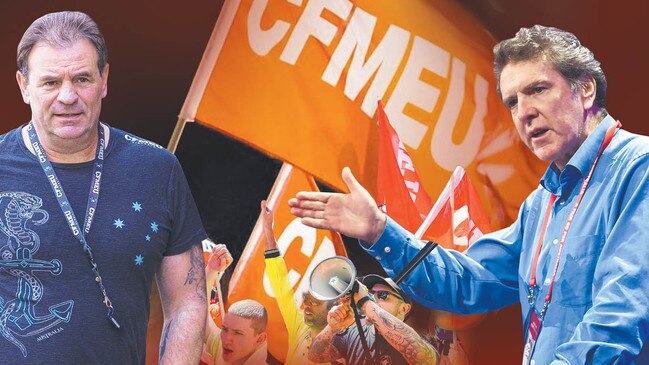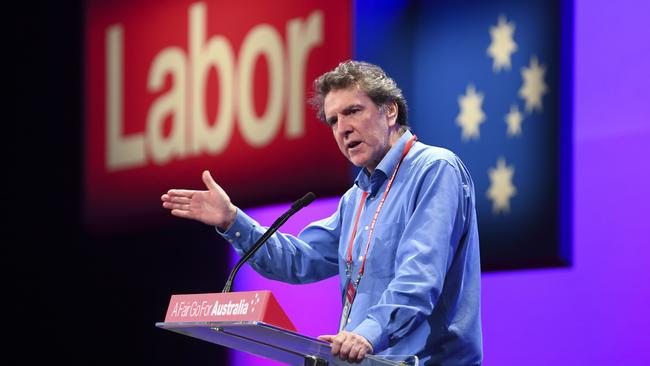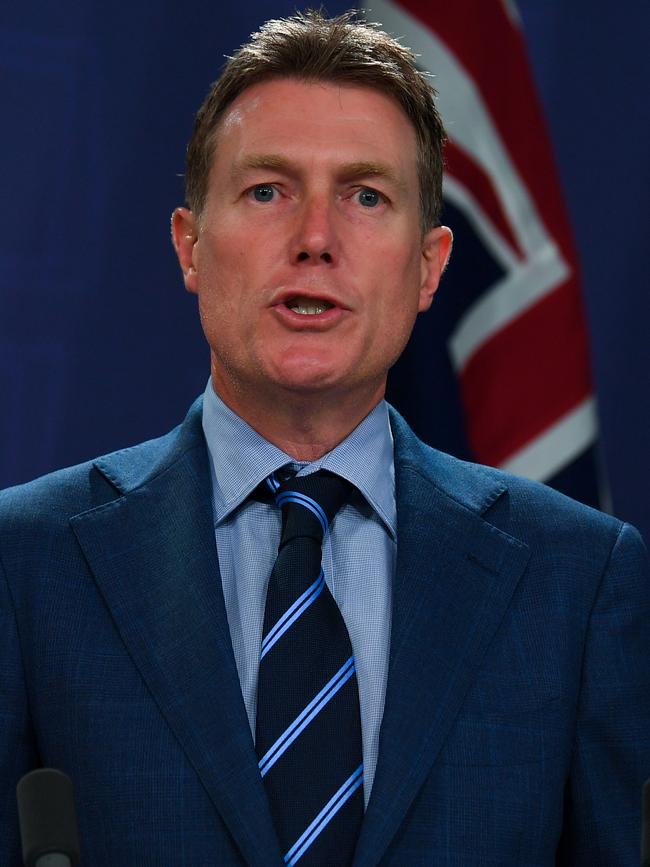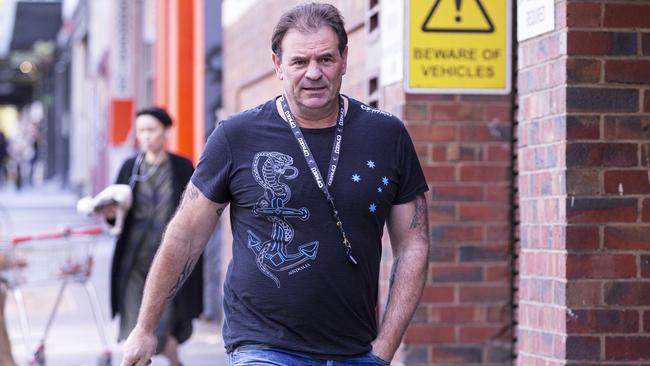High stakes in CFMEU civil war between John Setka and Michael O’Connor
The civil war engulfing the CFMEU is undermining the ACTU’s campaign to kill off the Coalition’s union-restricting legislation.

Inside the union movement, there is growing frustration that the civil war engulfing the CFMEU is undermining the ACTU’s campaign to kill off the Coalition’s union-restricting Ensuring Integrity Bill.
The federal government is seeking to move on from last year’s politically embarrassing defeat of the bill by holding talks with the Senate crossbench ahead of an expected second tilt at passing it this parliamentary session.
But just as Labor and the ACTU wanted divisions inside the Construction Forestry Maritime Mining and Energy Union camouflaged from their political opponents, legal action by the CFMEU’s national secretary, Michael O’Connor, against the union’s Victorian leader, John Setka, ensures the internal acrimony is again on public display.
O’Connor launched the action last month, accusing Setka’s construction branch of “poaching” members from the union’s manufacturing division.
Supporters of O’Connor blame Setka for the escalation, claiming he forced O’Connor’s hand by ignoring calls to stop poaching.
Bemused union leaders concede the fresh outbreak of disunity hurts their bid to defeat the so-called “union-busting” bill.
“Every attempt has been made to try and resolve it internally, to try and stop John poaching those members, but he’s just ignoring it,” one senior official tells Inquirer.
“This is not helpful at all in terms of Ensuring Integrity. It just makes it look like the CFMEU doesn’t even follow the rules of their own union.
“If the bill does get through, Setka will be the No 1 target. We are trying to save his union but he’s firing rocket launchers at us.”
O’Connor’s legal action follows months of union infighting that coincided with Setka being charged last year with harassing his wife, and the ALP’s bid to expel him as a member.
Setka, who was placed on a one-year good behaviour bond in June after pleading guilty, resigned from the ALP in September and he continues to defy calls from ACTU secretary Sally McManus and an array of national unions to quit as state CFMEU leader.

Poaching as payback
The alleged poaching and the retaliatory court action are driven by a breakdown in relations between O’Connor and Setka. Officials say Setka remained indignant that O’Connor failed to publicly back him last year and the poaching was payback for the lack of support.
“Anyone who didn’t stand up and support John in his family violence case is now, in his mind, public enemy No 1,” a source says.
As relations worsened, O’Connor and manufacturing division officials moved out of the union’s Victorian head office. The move will cost members because the union will be paying for a new lease while parts of the Victorian headquarters are now empty.
“It is a waste of members’ money but the relationship has become untenable,’’ one official says.
Setka’s supporters accuse O’Connor of thwarting Setka’s ambitions to “integrate” the manufacturing division with the construction division.
“Michael stood up to John, refusing to support the amalgamation of the two divisions,” one source says. “That’s a factor in the bad blood but this is really about Michael not supporting John with his personal issues.”

Tensions escalated when Setka allegedly demanded two manufacturing division organisers defect to the construction division and “pinch” members from their former division.
Sources say the two organisers told senior officials Setka called them to his office and told them to defect from the manufacturing division to construction “or you won’t have a career left”.
“When you come over, you are going to be pinching their (manufacturing) members,” he allegedly said, according to the organisers’ accounts to national officials.
The manufacturing division represents workers in the forestry, furnishing, building products, pulp and paper, textile, clothing and footwear manufacturing industries. Poaching from a rival division is in breach of CFMEU rules and Setka’s alleged conduct provoked a public rebuke from the union’s influential mining and energy division, which accused his branch of engaging in the “unprincipled” poaching of members.
CFMEU national president Tony Maher, who is also the mining division president, has publicly backed the legal action against Setka’s branch. Maher says Setka told him last year that hundreds of manufacturing division members had resigned and joined the construction division.
Maher notes 19 resignation letters he has seen are on construction division letterhead.
Beyond the alleged rule breach, officials say a motivation for the legal action was that Setka’s tactics were putting further financial pressure on the struggling manufacturing division.
Financial accounts filed with the Registered Organisations Commission show the division recorded losses of $1.58m in 2017 and $3.358m in 2018.
It is understood the division was on track to report a further loss for the 2019 calendar year.
Sources say Setka’s branch has signed up between 150 and 200 members from the manufacturing division. The recruits were largely commercial floor layers and glaziers who each paid union dues of about $1000 a year.
Given its financial position, the manufacturing division could not afford such a loss of membership revenue, sources say.
They say if Setka’s branch is not stopped, it could succeed in recruiting 400 commercial floor layers from the manufacturing division, equating to a $400,000 loss in annual revenue.
“It can’t sustain another two years like it’s gone through,” one official says.
“The loss of members represents a significant revenue loss for the division. It’s on its knees.”
O’Connor refused to comment when contacted by The Australian, and Setka did not respond to a request for comment.
In a statement last Wednesday, Setka’s deputy, Elias Spernovasilis, said: “Members have been choosing to move divisions on their own accord for a number of years. Making the move to the construction division after working on construction sites isn’t uncommon.
“Our division has represented our brothers and sisters on site every day, delivering counsel and camaraderie, helping to prevent fatalities and getting members home safely to their families.”
Spernovasilis says the choice for workers to shift divisions and be covered by the same union as other onsite construction workers is obvious.
“We respect the wishes of members who have made this choice,” he says.
Maurice Blackburn principal Josh Bornstein, who is acting for the Victorian construction division, says the case is about a dispute over the proper interpretation of the union’s rules.
“The construction division believes that this matter should be dealt with by the appropriate decision-making bodies under the rules of the union, not by litigation,” Bornstein says.
“The construction and general division will argue that its rules mean that the workers concerned — who work on construction sites — can choose to join the construction and general division (of the union) and that it makes more sense for them to be covered by the same union as other onsite construction workers.”
Integrity bill threat
The case is scheduled for a Federal Court hearing on Tuesday, which is likely to coincide with continuing negotiations between the government and the Senate crossbench over the Ensuring Integrity Bill.
Passage of the bill would be the biggest setback for the union movement since WorkChoices, making it easier to shut down unions, ban officials and drain the time and resources of unions through legal action by an emboldened aggressive regulator.
Attorney-General and Industrial Relations Minister Christian Porter is seeking to succeed where his three ministerial predecessors failed, securing crossbench support for legislation that would impose extraordinary controls over the industrial wing of the Coalition’s political opponents.

But he is also trying to convince them to legislate these restrictions at a time of flatlining wages, record low union membership, historically low levels of industrial action, stunning and seemingly endless disclosures of companies underpaying workers, and recent mind-boggling revelations of corporate misconduct a la Westpac.
Under the proposed legislation, which is not retrospective, a CFMEU official who committed one workplace breach, and was successfully prosecuted by the government’s building watchdog, would be exposed to a Federal Court application that could see them banned from holding office.
Offences under the building and construction legislation that could see an official exceed the threshold include coercion or undue pressure, unlawful industrial action, unlawful picketing and hindering/obstructing an inspector or federal safety officer exercising compliance powers.
Given the CFMEU’s track record, and the Australian Building and Construction Commission’s enthusiasm to prosecute the union and its officials, it would not be long before officials were facing application bans.
Indeed, Porter has predicted it would only take weeks, based on current trends, for a CFMEU official to break the law and trigger a process that will lead to a ban. He says action triggering deregistration of a union or one of its divisions, most likely Setka’s branch, could occur in months.
Centre Alliance backed the original bill but has put its support on hold pending negotiations between Porter and senator Jacqui Lambie over her proposed amendments. The government is likely to need her support to get the bill through the Senate.
She has held preliminary discussions with Centre Alliance’s Rex Patrick about her amendments, which the Coalition rejected last year after it wrongly assumed One Nation would deliver it the Senate numbers to get the bill passed.
“The government voted against my amendments last year saying they were unworkable but if they want to backflip I’d be happy to see it,” she says.
Patrick says: “If and when the Attorney-General gets close to agreement with Jacqui, he will come to us and seek our views and support on her amendments.”
An imminent government decision on whether to move the maintenance contract for the Collins-class submarine from Adelaide to Perth will also impact his position.
“With respect to a decision on the future location of submarine full-cycle docking work, we are confident, on merit, that this work will stay in SA,” Patrick says.
“The government has been respectful of our concerns in relation to this and has been engaging us. We have told the government that a politically based decision to shift the work will disturb the positive way in which we work with government, and that will include the manner in which we engage on legislation.
“We anticipate a submarine decision will be announced in the next couple of weeks, likely before the government has concluded Ensuring Integrity negotiations with Jacqui.”
The sins of Setka
Setka is unlikely to take any responsibility for handing the government momentum for its anti-CFMEU crusade, but he should.
As well as ignoring the calls by McManus and 14 union leaders to resign, he rejected a similar demand by Lambie, leaving union officials privately accusing him of putting his self-interest ahead of the broader needs of the labour movement.
If the bill passes, the pursuit of unions would fall to the Registered Organisations Commission, the so-called “independent” regulator, which only late last year had its most high-profile probe — the investigation into the authorisation of AWU donations to GetUp and Labor candidates when Bill Shorten was the union’s leader — quashed by the Federal Court.
The two-year saga damaged the credibility of Michaelia Cash, tarnished the standing of the commission and cost the ROC and the AWU between $1m and $2m.
Rather than move on, the ROC is spending more taxpayer funds by pursuing a full Federal Court appeal. The episode, and the ROC’s already tireless pursuit of unions over their record-keeping requirements, suggests it would be an enthusiastic user of its new powers under the bill.

It would be able to work with the ABCC to try to bring down the CFMEU. But it might need to tread more carefully than it has over the past two years.
McManus says given the political focus on the “rorting” of sports grants and the bushfire crisis, it will look bad if the government seeks to bring on the bill.
“It’s going to make it look as though they are just all about politics rather than the needs of people, so I reckon if they tried it on, it would backfire,” she says.
The government is banking on voters being tolerant, if not supportive, of the strategy against the CFMEU. But the public will be less forgiving if the ROC were to aggressively pursue other unions for minor breaches of the law.
If passed, this new era of union controls and restrictions will play out over the coming years, a forecast period of continuing low wages growth, more disclosures of wage rips-off and legal proceedings dealing with high-profile corporate malfeasance.
Porter is separately proposing new measures to criminalise wage theft. But he will also initiate national debate about proposed changes to “complex” awards and the need to rewrite unfair dismissal laws for small business.
Labor and the ACTU insist the proposed Ensuring Integrity laws are designed by the government to weaken unions before it moves on to its objective of cutting employee entitlements and making it easier to sack workers.
Porter’s combined workplace relations changes would be bigger than any industrial relations agenda tried by this six-year-old government. It would be popular with business and conservatives and hurt unions. But it carries political risks, particularly if the ROC should decide to overplay its hand.



